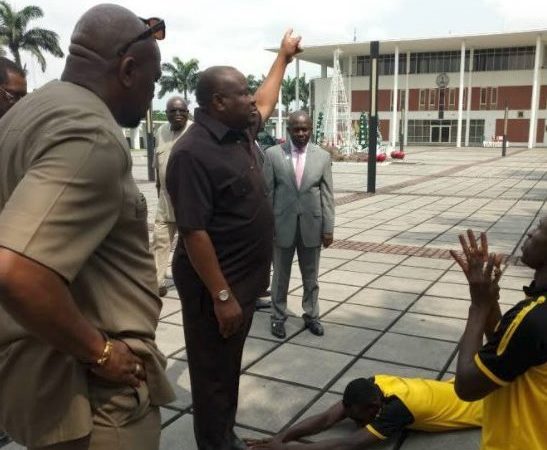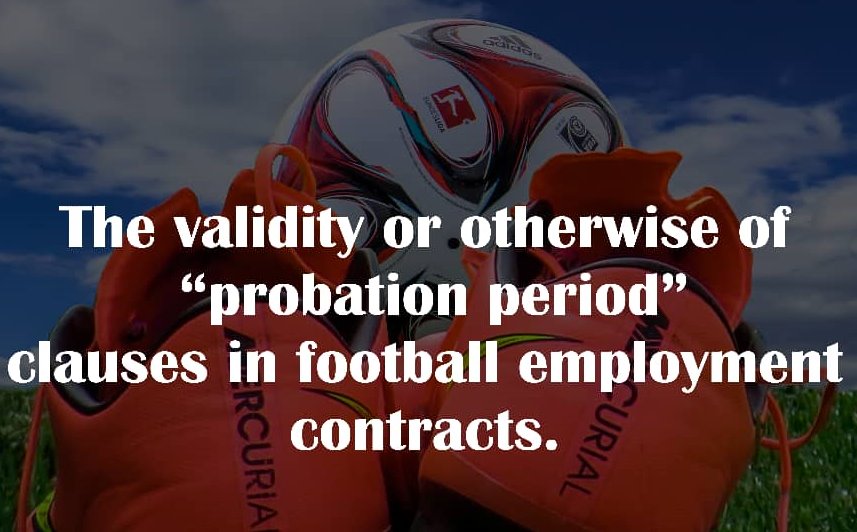
Termination of Football Contracts: What is “Just Cause”? (2)
INTRODUCTION
As a sequel to the first part of this article which examined “just cause” for unilateral termination as regards clubs, this second part of the article aims to discuss “just cause” for unilateral termination of contracts by footballers. It should be noted that what would amount to just cause for football clubs are different from that of players.
It is thus important to examine circumstances that may, or may not amount to just cause for termination by players.
Outstanding Salaries.
In line with the jurisprudence of both the DRC and CAS, a club’s persistent failure to pay the salary of a contracted player for a certain period can be considered an unjustified breach of an employment contract by a club. In 2018 for instance, former Cameroonian International player, Alex Song, left his former club, Rubin Kazan, after FIFA intervened and his contract terminated due to the club’s inability to pay its players’ wages. It was stated that the player was being owed 7.9 million pounds by Rubin Kazan.
However, it is worthy to note that before a player can validly terminate his contract unilaterally, a number of things must be proven.
First, the club’s inability to fulfil its financial obligation towards the player must be established. This means that the player must prove that his wages have not been paid by the club for a period of time, which is a breach of the club’s obligation towards him. In a DRC Decision, the Chamber held that the club had neglected its financial obligation towards the player, after it was established that the club had not paid the player for over four months and two of the four instalments pertaining to the signing on fee were still unpaid (See DRC 10 June 2004, No. 64133). It must be noted that the period of time which would be regarded as ‘just cause’ matters. For instance, being owed a month’s salary does not constitute ‘just cause’. This was the reasoning of the DRC, where the Chamber decided that the non-payment of one month’s salary was not ‘just cause’ for a player to unilaterally terminate his contract. (See DRC Decision of 23rd March 2006, No. 36460.). Also, the player must be able to specify the exact amount that is being owed by the club. The DRC in a case, decided that a player’s inability to be precise as to the exact amount, does not speak in favour of the player’s good faith (See DRC Decision of 23th February 2007, No. 27698).
It would also be considered whether or not the player accepted any postponement as regards outstanding payments. The DRC held that a player could not claim ‘just cause’, as it didn’t exist, due to the player accepting the postponement of payments, which was interpreted as consenting to delayed payments (See DRC Decision of 8th June 2007, No. 67770).
Furthermore, the player must also be able to establish that he has warned the club before terminating the contract; usually referred to as “notice of default”. This was the position of the DRC where it stated that even without being stipulated in an employment contract, this was a procedure regularly confirmed and applied by the DRC and the CAS (See DRC 10 August 2007, no. 87745).
It is also important for the player to be able to prove that he offered his services during the period of the contract.
Conclusively, two main conditions which a player must always establish according to the DRC are: that the late payment of the player’s salary is not insubstantial; and that prior to the contract termination, the player had issued the club a warning, drawing the club’s attention to its violation of its contractual obligation (See DRC 24 November 2011, No. 1111796).
Exclusion and Deregistration.
It is a general principle that having a subsisting employment contract with a club does not guarantee that a player must be fielded or train with the first team; as long as his/her salaries are being paid and the club fulfils its other obligations towards the player. This was the decision of the DRC where the Chamber decided that as long as the player is regularly paid his salary and the club respects all other contractual obligations, a player must accept that he might not be lined up, and that not having the player fielded does not constitute a breach of the contract. It was also stated that the decision to field the player was left to the discretion of the club, which the DRC respects. (See DRC Decision of 9th May 2014, No. 05143281). In such a circumstance, the player would not have just cause for the unilateral termination of the contract.
However, if it is contained in the player’s contract that the player may only train with the first team and/or that the player would always remain in the first team regardless of his performances, a non-fulfilment of that clause by the club would amount to a breach. In that circumstance, the player would have a just cause to unilaterally terminate his/her contract. (See the DRC Decision of 8th June 2007, No. 67229).
In the DRC Decision of 13th December 2013, No. 12131045, a player was excluded from training with neither the first team nor the second team. The DRC considered it important to point out that among a player’s fundamental rights under an employment contract, is not only his right to a timely payment of his remuneration, but also his right to be given the possibility to compete with his fellow team mates in the team’s official matches. The DRC emphasized that the non-registration of a player effectively bars, in an absolute manner, the potential access of a football player to competition and, as such, violates one of his fundamental rights as a football player. It would also constitute just cause where the player is barred from the club’s activities.
Also, in the determination of just cause for a player, the DRC considers the period of time which the player was excluded by the club. The longer it is, the likelier the Chamber is to hold that there is just cause.
Sporting Just Cause
Pursuant to Article 15 of the Regulations on the Status and Transfer of Players (RSTP) 2018, a player may also unilaterally terminate his contract where, despite being an established professional, he appeared in fewer than 10% of all the official matches which his club played during a football season. The player may terminate the contract on this basis in the 15 days following the last official match of the season of the club. In such a case, sporting sanction will not be imposed on the player, though compensation may be payable to his/her club. Although the determination of an “established professional” is judged on a case-by-case basis, it has been described in the FIFA Commentary as a player who has terminated and completed his training period, and whose level of footballing skill is at least equal to or even superior to those of his teammates who appear regularly.
CONCLUSION
Having discussed above, circumstances of just cause for players based on established jurisprudence of the DRC & CAS, a player must be certain that a breach of the club is such that amounts to just cause for unilateral termination. However, it must be noted that just cause for players is not limited to those discussed above. A recent example is an incident which occurred in May 2018. The president of Sporting Lisbon (Bruno De Carvalho) heavily criticised the team’s performance against Athletico Madrid. This resulted to about 50 of the toughest ultras of the club forcing their way into the team’s training ground, who assaulted both players and staff members. The assault left the club’s top scorer for the last few seasons – Bas Dost – with a nasty head injury. Consequently, a number of the club’s key players – Rui Patricio (the club’s captain), Bruno Fernandes, William Carvalho and Gelson Martins decided to terminate their contracts and joined respective clubs of their choice.
Thus, other situations which are of an extreme nature which would not be reasonably expected of the player to put up with in the employment relationship, may nevertheless still amount to just cause for unilateral termination even though such have not been decided upon before by the DRC or CAS.
Finally, it should also be noted that parties may also define what would constitute ‘just cause’ in an employment contract. In a DRC Decision of 15th March 2013, No. 03132433, both the club and player had agreed to a clause in the contract wherein the player could terminate the contract if the club defaults in paying his salaries for three months. The player however terminated the contract after only two months of arrears, and the DRC held that there was no just cause because the parties had freely consented to three months defaults as what would constitute just cause.
Written by – Ayomide Eribake.



